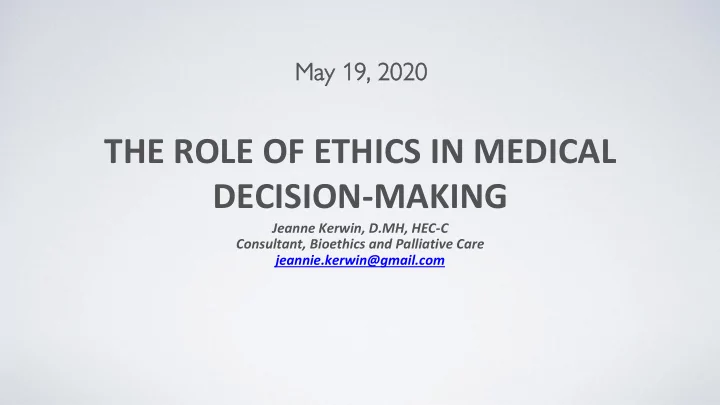

May Ma y 19 19, 202 , 2020 THE ROLE OF ETHICS IN MEDICAL DECISION-MAKING Jeanne Kerwin, D.MH, HEC-C Consultant, Bioethics and Palliative Care jeannie.kerwin@gmail.com
WHAT IS ETHICS? HOW DO WE DISTINGUISH IT FROM OTHER DISCIPLINES
• What is the Role of Ethics in Health Care? • Ethics Committees: Quinlan case (1976 ) - hospitals, nursing homes, health care agencies. Role: (1) Education, (2) Policy and (3) Consultation • Ethics Consultation: Bedside, Individuals/families/providers • Role of ethical input in Covid-19 planning: • Allocation of scarce resources protocol; DNR policies, Visitor restrictions, triage of patients; system level priorities; protection of vulnerable populations; protection of medical providers
WHAT DO WE LOOK AT? • Ethics analysis • Competing incentives Type to enter a caption.
WHY IS ETHICS SO IMPORTANT IN HEALTH CARE TO THE I/DD AND DEMENTIA POPULATIONS? • Vulnerabilities: • Decisional capacity • Understanding choices • Judgmental views of others about “quality of life” Who will decide for her? • Underlying chronic conditions - shorter life “expectancy” • Decisions of “others” (family, guardians, unrepresented) • Lack of advance care planning discussions and documents to protect preferences/values
H OW DO ETHICS CONSULTANTS HELP IN ORDINARY TIMES? • Consultation with patients and families struggling with decisions • Consultation with legal guardians prior to medical decisions (mandated in some states) • Education for caregivers/guardians about medical choices, prognosis, expectations (CPR), options, benefits and burdens/risks • Resource for medical providers about policy, patients’ rights, laws • Facilitate advance care planning for I/DD and dementia patients and caregivers
ETHICAL FRAMEWORK ORDINARY TIMES VS PANDEMIC CRISIS Prin inciple: A All persons are tr treated as equal on th the basis of th their humanity alone In In Ordin inary Tim imes: Respect for individual autonomy and self-determination Decisions made by patient/surrogate/physician in keeping with the patient’s preferences and best interests Patient/Surrogate/Physician - Shared decision-making In In Pandemic: Utilitarian Model: ““Greatest good for the greatest number” - Respect for the Common Good, not just the sum of the individual good…. an integral sense of the common good “The good of the whole partly determines each individual’s good”
The Trolley Car Example of Utilitarian Model of Ethics…. • What would you do? Type to enter a caption.
THE ROLE OF ETHICS IN A PANDEMIC
ROLE OF ETHICS IN PANDEMIC • Preparation : • Critical role of ethics consultants to be on Triage Allocation Planning Teams • Recognition of “ exclusion criteria ” and “ co-morbidities ” unfair as absolute barriers; rather than methods to “prioritize” all patients based on objective medical criteria that does not discriminate against those with disabilities • Adoption of protocol with ethical structure/principles that have pro-active protections for the disabled and other vulnerable populations
What should an Allocation Protocol Look Like? Process/Protocols for allocation of scarce resources must be: Reasonable Objective Transparent Applicable to all patients
WHAT DOES THAT TRIAGE PROTOCOL LOOK LIKE? SAVING LIVES AND SAVING LIFE-YEARS ENSURING MEANINGFUL ACCESS FOR ALL PATIENTS • Protocols only enacted when State/Regional authority declares State of Medical Emergency and facility calls for Crisis Standard of Care (not enough ICU beds, ventilators for number of patients needing them) • Individualized patient assessments based on objective medical knowledge (SOFA scores) • Patients more likely to survive with ICU care prioritized over those less likely to survive with ICU care • Patient with severe limited life expectancy (even if they survive the acute illness) given lower priority over those with greater life expectancy - no examples listed of conditions that limit life expectancy - such lists run risk of becoming “blanket” judgments • Absence of rigid categorical “exclusion criteria”
ETHICAL ISSUES FOR I/DD AND DEMENTIA WE FOUND DURING… • Sense of urgency to “triage” prematurely (ED/ICU) The Covid-19 Cloud • “life expectancy” “life years” assessment - sometimes biased judgment • Staff and home care providers expected to shelter in place if Covid + (no PPE) • Lack of staff to accommodate increased needs (cancelled day programs, activities) • Behavioral difficulties (difficult to isolate residents, wear masks, - keep safe) • Lack of testing for asymptomatic infection (staff and residents); • Visitation policies for hospitalized patients; (family, support person) • Dying alone - grief, bereavement services, funerals, staff impact - complicated grief
WHAT IS NEXT? • Review State/Hospital allocation protocols • Community grass roots efforts to increase PPE and awareness of needs in group homes, nursing homes and congregant living • Examine State/Hospital visitation policies for hospitals (NJ - example) • Prepare for expanded facility options for separation of Covid + patients • Work with State & Guardian services to expedite decision-making process • Recognition and value of staff in congregant homes and home settings
WHAT MORE CAN WE DO? • Review the data (what happened; to whom; where; mortality rates; infection rates) - how can we do it better? how can we be better prepared ? • Stories and experiences from caregivers and patients • Increase conversations about “ what if ”…. advance care planning - for all of “us”. ( POLST.org ) (“Life Story” by Teepa Snow) • Build community awareness and collaboration - lessons from Covid-19
RESOURCES “Hospitalized Patients & Designated Support Staff Policy Statement”, Committee on Public Policy and Advocacy. • April 2020. AADMDCONFERENCE.com. AADMD.org “Confronting Disability Discrimination During the Pandemic” by Katie Savin and Laura Guidry -Grimes, • www.thehastingscenter.org, April 2, 2020. “Evaluation Framework for Crisis Standard of Care Plans” by Ari Ne’eman, an Sam Bagenstos. April 8, 2020. • POLST.org , “Guide for I/DD individuals” • EndofLifeWA.org (dementia advance directive) • • The Art of Dying Well by Katy Butler
THANK YOU!!
Recommend
More recommend